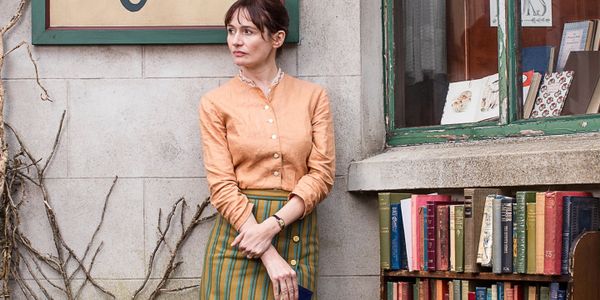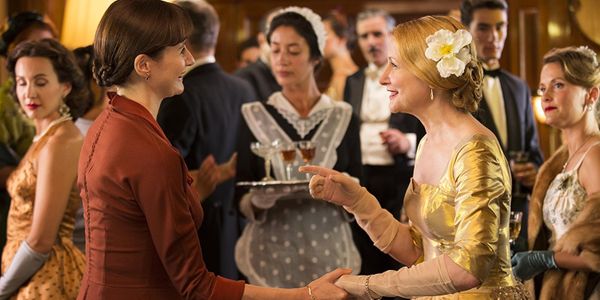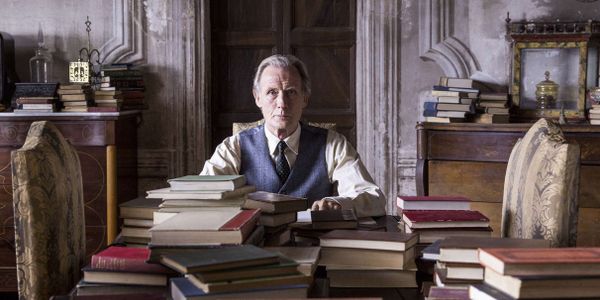THE BOOKSHOP: An Adaptation That Flew Too Far From The Sun

Tom is a recent graduate based in the UK, who…
The Bookshop is a film displaced in time and space. It’s adapted from the book of the same name by Penelope Fitzgerald, which was released in 1978 and set in 1959. Similarly, the book and film are firmly grounded in the Englishness of the Suffolk setting, yet it had German producers and was filmed partly in Spain.
The film tells the story of a recent widow, Florence Green, who decides to open a Bookshop in her Suffolk village of Hardborough. This is much to the chagrin of members of the community, who aid and abet her in various ways. The film had the potential to be a strange showcase of quirky Britishness, which would ground it firmly in the Heritage Film tradition from which it was born. Yet the inconsistent pacing and plot of the film grounds it through the entirety of its run-time, dwarfing it in the shadow of what could have been.
Bad-aptation
The fact that The Bookshop is a literary adaption is being touted as one of its primary selling points – yet it’s also its biggest problem. Adapting from book to screen is a challenge different directors have faced with varying success, and Coixet stumbles here by adapting the book literally, instead of working out a way to translate the spirit of the text.
The novel explores the story of the widow starting a bookshop in a Suffolk village (as does the film), yet it revels in the antagonism of a village in a post-war identity crisis, such as the forces of nature that rot her shop, the neighbours that are reluctant to support her cause and even the larger powers that organise the village. These form a venerable shadow that the shop must bloom under, emphasising the resilience and drive of its proprietor.

Coixert’s attempts to keep intact too many of the book’s plot threads don’t give most of them sufficient time to flourish, resulting in themes and ideas being picked up and dropped with reckless abandon as the film darts between the stories. For example, the character of Mr Brundish, albeit depicted elegantly by Bill Nighy, has only a passing influence on the plot, and the time spent setting up the wonder surrounding the man seems almost like a Gatsby-esque waste of a mystery. His interactions with Florence Green also seem to contradict the themes of the film, as it questions the unification and antagonism of the town.
Many important plot details likely make a lot more sense to a reader of the book than someone who has only watched the film. It is only revealed rather late in the film that it is actually set in the 1950s (anyone that has been to Suffolk knows the fashion hasn’t changed in about 200 years). This information on setting is a pivotal piece of information in characterising the town – it is still struggling to rebuild and find its identity in a post-war Britain. By neglecting to mention this information, or worse, assuming the viewer possesses the same information as the creator, one of the most interesting characterisations in the film goes forgotten.
The key to a successful adaptation is retaining not the actions and characters of the text but the spirit, soul or themes to it. Whilst some films find success by remaining close to the source material, many must severely cut down, bulk up, or alter the original story and characters in order to keep alive the ideas the original exposed. By keeping the story and characters relatively unaltered from the book, Coixert fails to accurately translate to the screen the true story of the book – an individual and a community exploring what those words mean in the new Britain of the 1950s.
Not a page turner
The lack of a heart line resulting from this troubled adaptation means the film suffers in several aspects – most notably with regard to pacing. The events in the story that relate to the bookshop itself are far and few between, whilst the film is peppered by scenes of characterisation of individuals and the village which have little impact on the story. The uneven balance of these two types of scenes means the film has an uneven pace – at some points the story leaps through important events at speed, at other points far too much time is spent on unimportant or dull side affairs.

A prime example of this is the character of Milo North. Whilst portrayed as a weaselling and unreliable intellectual very successfully by James Lance, the character simply has far too little influence on the plot to justify his numerous appearances. The character is portrayed repeatedly as one with no allegiances or commitments – thematically, therefore, he represents no themes or ideas that the story tries to explore. Scenes with him drag the pacing down to a crawl, and later attempts to characterise him as a morally dubious man fail as audiences already associate him as a tiring supporting character.
Naturally a film set in, and exploring, a small English town has to be slow, simply to represent this setting. Yet the way the script misses beats and dramatically alters pacing means it fails to evoke the sleepy setting it tries to. Instead, the film moves at a consistently inconsistent rate – usually intolerably slow, but at times incomprehensibly fast. Perhaps if the film had a better idea of what story it wanted to tell it could focus on these scenes more, but by trying to adapt the book wholesale the pacing suffers.
A farewell to qualms
The saving grace of The Bookshop, the sole reason to watch it, and the cradle of whatever spirit the film retains, is the characters. Each member of the village is written and acted perfectly, and as such the ecosystem and hierarchy creates a varying atmosphere of awe or fear depending on who is present.
The film is carried by Emily Mortimer as Florence Green, the proprietor of the Bookshop. Her performance evokes equal parts of determination yet doubt; politeness despite adversity; despair creating confidence. Her nuanced performance makes the character empathetic yet never too far into the focus of the story to drown out her place in the village’s ecosystem. It’s undeniable that her acting is the tonic to the film’s poor pacing, riding out its slow crawl with charisma and wit.

Her interactions with characters present some more of the other highlights of the film. These include Honor Kneafsy as a child who works part-time in her bookshop and Bill Nighy as the aforementioned enigmatic patriarch of the village. Through both of these characters and their interactions with Green comes the most enjoyable scenes from the film, from the former’s childish comments on the antagonists of the film to the latter’s fascination with Ray Bradbury. It’s a shame that there is no real plot for the characters to be a part of, as this would make their parts worthwhile.
The Bookshop: Conclusion
Some parts of The Bookshop make for a truly enjoyable film, like the characters, their interactions and their quirks. If these characters had been written in to a film that made them a part of something bigger than them, or understood exactly what story it was trying to tell, it could have made for a great story.
All films are a sum of their parts, but the weak parts of The Bookshop overshadow the few strong points to make a film that is, frankly, boring.
Which films do manage to be literal adaptations of books?
The Bookshop is to be released in the UK on June 29 2018 and in the USA on August 24.
Does content like this matter to you?
Become a Member and support film journalism. Unlock access to all of Film Inquiry`s great articles. Join a community of like-minded readers who are passionate about cinema - get access to our private members Network, give back to independent filmmakers, and more.
Tom is a recent graduate based in the UK, who writes about films and games, and makes a few of his own. If he's not watching a film, playing a game or writing a script - don't worry! - he's probably just gone to make a cup of tea. He's never far from a screen.













